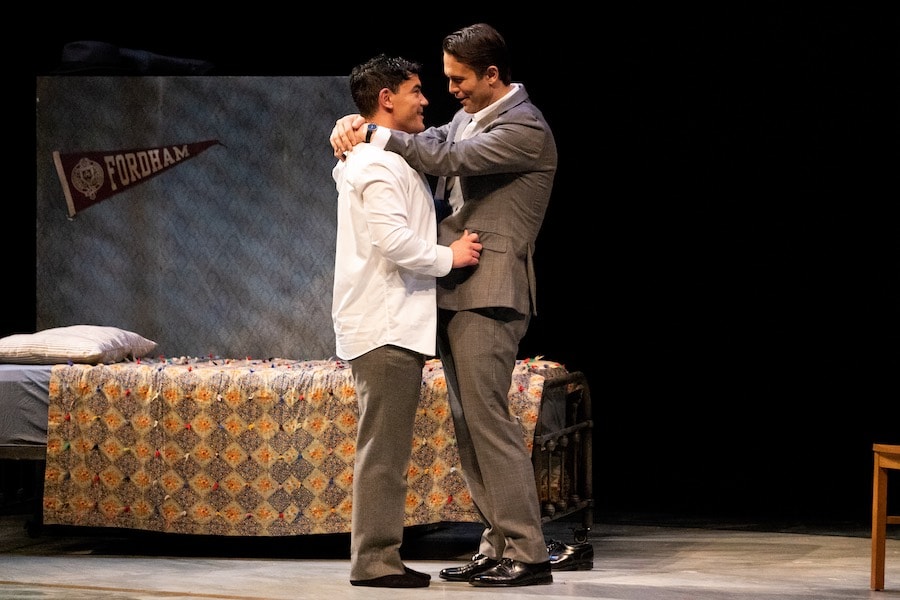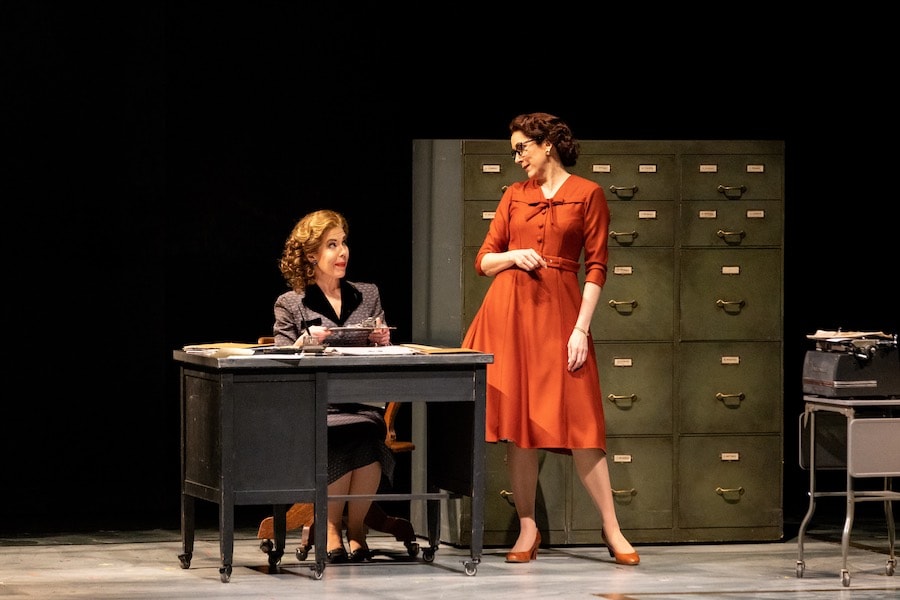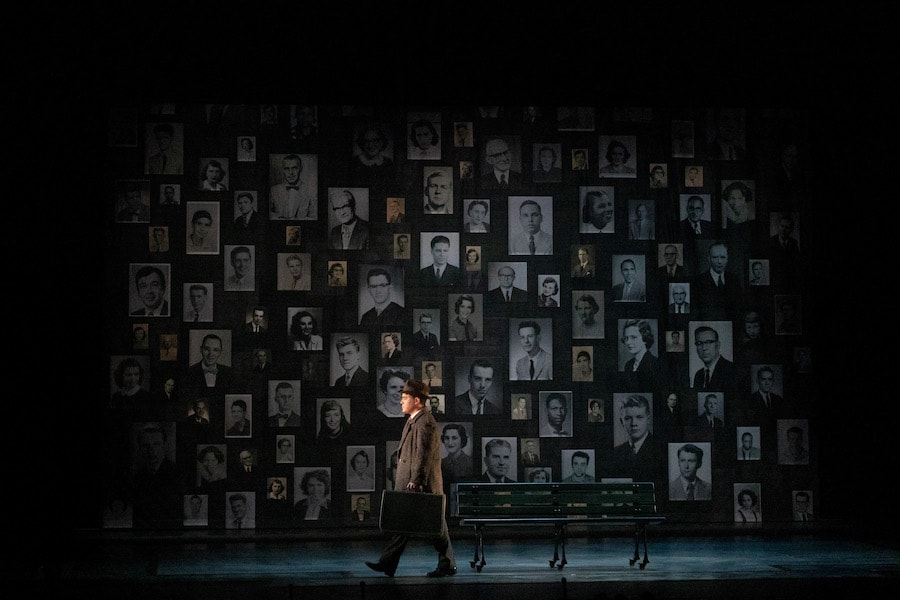During the notorious twin panics of the early 1950s, the Red Scare and the Lavender Scare, targeting those with leftist and “deviant” tendencies, respectively, why did people name names, including the names of friends, ruining reputations, ending careers and relationships, sometimes resulting in prison sentences? Based on a 2007 novel by Thomas Mallon, Fellow Travelers, a 2016 opera by Gregory Spears, with libretto by Greg Pierce, ties that question together with the fraught relationship of two gay men in the political maelstrom of McCarthy-era Washington.

The term “fellow travelers” itself has multiple layers of meaning. To the red-baiting scaremongers of the time, a fellow traveler was someone who, while not being a card-carrying member of the Communist Party, parroted the party line. Protagonists Hawkins “Hawk” Fuller (baritone Joseph Lattanzi) and Timothy Laughlin (tenor Andres Acosta) are fellow travelers on a journey of love and loss, facing forces that make authentic lives unbearably costly.
The creators and singers carefully delineate the differences between the two men. Tim is young, just graduated from college, seeking work as a Congressional staffer. He is very conservative politically, supporting McCarthy’s purge of “reds.” He is a devout Catholic. He grapples movingly with the tension between the strictures of his faith and the joy and fulfillment he has found, for the first time, in the arms of a man, especially in a powerful first-act aria set in a church. Somewhat disappointingly, Tim does not grapple in a similar way with the disconnect between his sexuality and his right-wing politics.
Hawk is older, a mid-level State Department official, as well practiced in the art of concealing his sexuality as he is in suavely leading a young man like Tim to fall in love with him. He willingly enters into what is, for him at least, a marriage of convenience with a woman, the better to camouflage who he is, while still working to maintain a sexual connection with Tim.
Tim wants more: a happy, ordinary domestic life with the man he loves. In what might be regarded as a demonstration of why despair has traditionally been considered a sin, Hawk sings a slow, quiet, sad, low-voice aria about the futility of hope for such a life. This aria, near the end of act two, takes place in 1957, ironically the same year that, also here in Washington, Frank Kameny, newly fired from his government job for being gay, began to imagine the long fight that ultimately culminated in dramatic gains for workplace and marriage equality.

The third major character in the opera is Mary Johnson (soprano Katherine Pracht). The kindest character in the opera, she knows and cares for both men and, unlike anyone else in their circle, can be trusted with their secret. In what for me was the highlight aria of the opera, she sings to Tim about Hawk being “a certain kind of wonderful,” warning him that Hawk has a history of breaking hearts.
Deliberately breaking Tim’s heart is exactly what Hawk does, costing him a potential job he dearly wants. Why? Hawk says his motive is to make Tim hate him, thereby liberating Tim from an emotional bond that can never give Tim what he wants. To Mary, whom Hawk tasks with telling Tim what he has done, it is simply a despicable betrayal. You’re a “swine,” she says, who has acted in a cowardly way to protect his own position. The opera gives the audience the opportunity to consider Hawk’s mixture of motives, and the extent to which the reasons someone may give for damaging someone close to them may differ from their underlying motivation.
Spears’ musical style for the opera is what Virginia Opera Resident Scholar Joshua Borths calls “globalist” or “post-modern,” combining tonal melodies for the arias, baroque-like vocal ornamentation, sometimes minimalist scoring reminiscent of Arvo Pärt, as well as intentionally chattering motifs for the opera’s political conversations. The score is nicely detailed: the first kiss between Tim and Hawk, for example, is underscored by ominous chords. The 22-piece orchestra, led by Adam Turner, provided a full, rich sound throughout and succeeded in bringing out the details of Spears’ score.
Like the score, Pierce’s libretto provided full portraits of the major characters, as well as telling vignettes for the supporting players. Among the latter, bass Joshua Jeremiah stood out as Senator McCarthy and the Interrogator, as did Katrina Thurman as the unpleasant Miss Lightfoot. Pierce made frequent use of repetition, the same phrase being said a number of times in short succession.
Directed by Kevin Newbury, the production moved smoothly through its short, cinematic scenes, as actors wheeled set pieces in and out on an otherwise bare stage. While the program did not identify an intimacy coordinator, the intimate scene between Tim and Hawk that initiates their relationship was quite beautifully crafted, both for visual and musical purposes.

Thomas C. Hase’s precise lighting design provided tight focus on characters in scenes featuring individuals, functioning like a film close-up while broadening focus for group scenes. The backdrop of Victoria Tzykun’s set served mainly as a screen for often long shadows cast by the singers until the very end of the opera, when it displayed a projection representing the many people who lost their jobs during the Lavender Scare. Paul Carey’s costume design was attractive and accurate for the period, with the odd exception of Tim’s Army uniform.
The emotions of love and betrayal are particularly well suited to opera, and Fellow Travelers makes a convincing case for the ability of contemporary as well as classical opera to bring those emotions alive for an audience, while speaking to issues all too salient in today’s climate of increasing political hostility to people seen as different.
Running Time: Approximately two hours and 15 minutes, including one intermission.
Fellow Travelers played on February 4 and 5, 2023, presented by the Virginia Opera at the George Mason Center for the Arts, 4373 Mason Pond Drive, Fairfax, VA.
The playbill for Fellow Travelers is online here.





Bob, thank you for your informed and thought-provoking review. I too attended the performance of Fellow Travelers on Sunday. I too found Adam Turner’s conducting was indeed. You picked out nice ideas. Only, I might question if this was indeed a love story. If Andres Acosta’s character had been a woman, I fear the Hawk character would have been judged as a harassing predator.
Hi Susan… interesting. I photographed this and did a review for Digital Beat Magazine and I too saw it, to a large degree, as one in power taking advantage of the naive and innocent… Loved the production!!